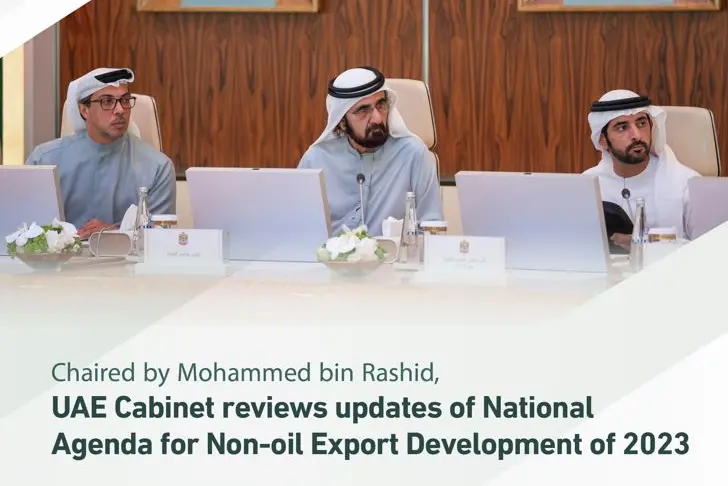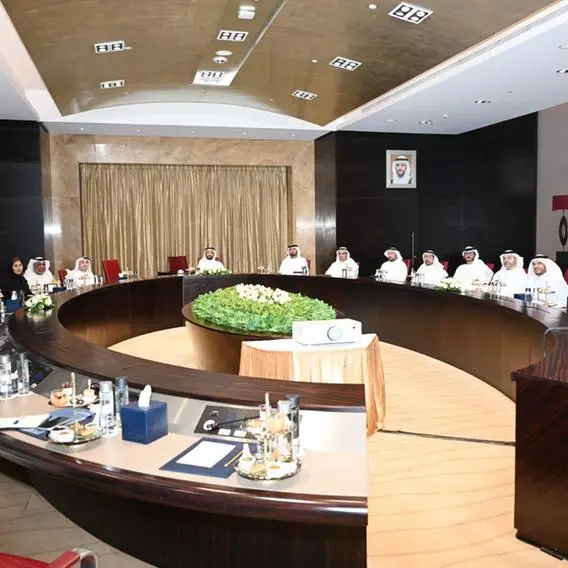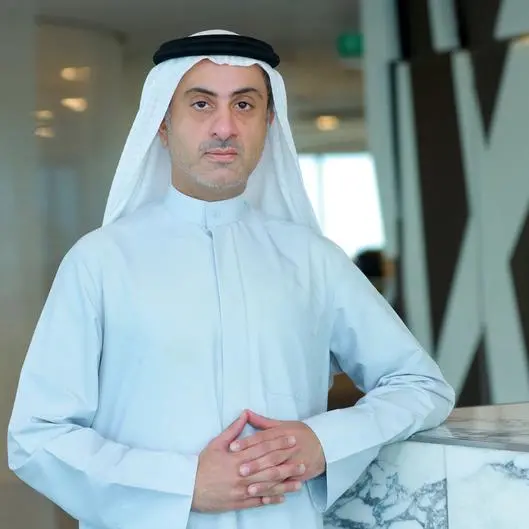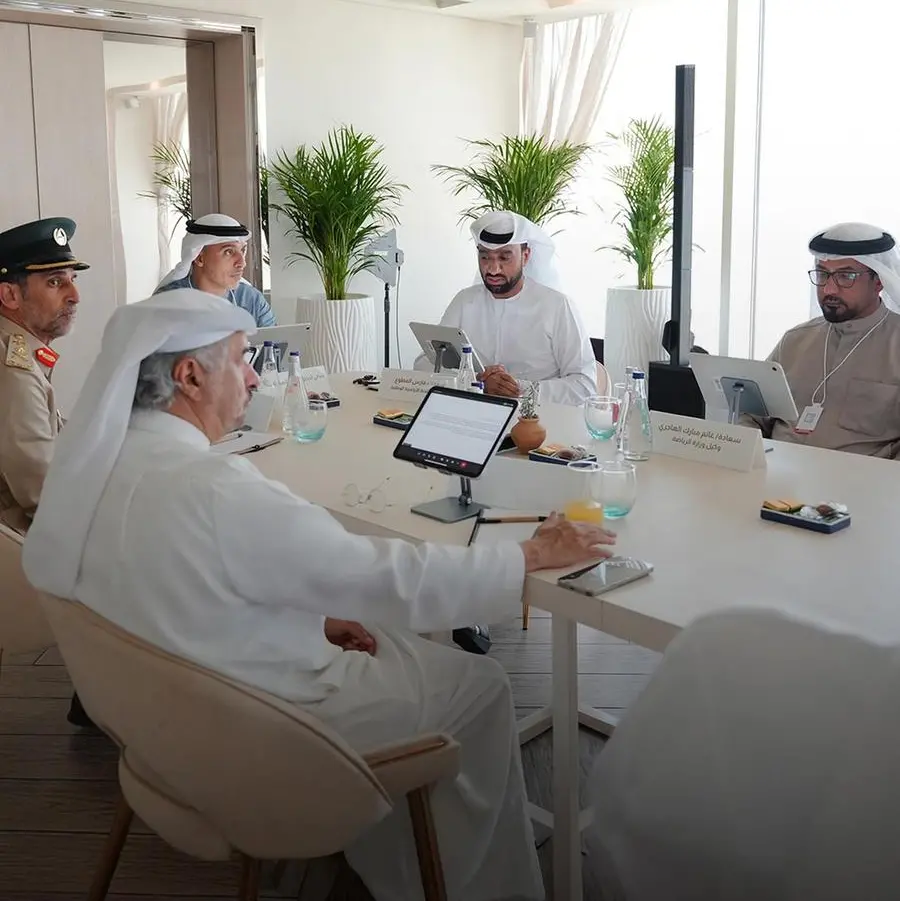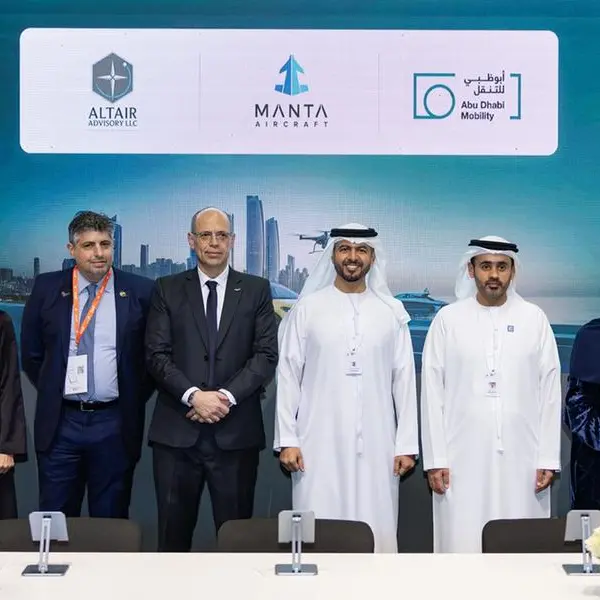PHOTO
United Arab Emirates: His Highness Sheikh Mohammed bin Rashid Al Maktoum, Vice President and Prime Minister of the UAE and Ruler of Dubai, has chaired the UAE Cabinet’s meeting at Qasr Al Watan, Abu Dhabi. The meeting was attended by His Highness Sheikh Mansour bin Zayed Al Nahyan, Vice President, Deputy Prime Minister, and Chairman of the Presidential Court; His Highness Sheikh Hamdan bin Mohammed bin Rashid Al Maktoum, Crown Prince of Dubai, Deputy Prime Minister, and Minister of Defence; His Highness Sheikh Maktoum bin Mohammed bin Rashid Al Maktoum, First Deputy Ruler of Dubai, Deputy Prime Minister, and Minister of Finance of the UAE; His Highness Lt. General Sheikh Saif bin Zayed Al Nahyan, Deputy Prime Minister, and Minister of the Interior; and His Highness Sheikh Abdullah bin Zayed Al Nahyan, Deputy Prime Minister, and Minister of Foreign Affairs.
His Highness Sheikh Mohammed bin Rashid Al Maktoum said, "Today, I chaired the first UAE Cabinet meeting of the new governmental season at Qasr Al Watan in Abu Dhabi. We began by reviewing the progress of the new academic year, as our schools welcomed 1.1 million students, and our national and private universities successfully commenced the academic year. Clear directives were issued to the education sector by the UAE President. Students are indeed back on track. We look forward to a successful academic year that aligns with the nation's aspirations."
His Highness Sheikh Mohammed bin Rashid added, "During the Cabinet meeting today, we reviewed the significant outcomes of our economic and investment development project. The economic decisions taken by the government during and after the COVID-19 pandemic have resulted in substantial and tangible achievements."
His Highness said, "At the end of the first half of 2020, the UAE had 405,000 companies, based on the valid business licenses statistics. Over the past four years, this number has grown to 1.021 million registered companies as of mid-2024, scoring a growth of 152%, according to the statistics of the UAE’s National Economic Register."
His Highness Sheikh Mohammed bin Rashid added, "The UAE has achieved accelerated growth, ranking fifth globally in real GDP growth and among the top 10 economies in various global competitiveness indices. The country attracted a record AED112 billion in foreign direct investment last year and secured the second position globally, after the United States, in the number of new foreign direct investment projects, which reached 1,323, a 33% increase compared to the previous year."
His Highness Sheikh Mohammed bin Rashid affirmed, "Since the onset of COVID-19, the government has enacted 30 economic decisions, laws, and policies that have significantly accelerated our economic growth. I assure everyone that the government will continue on this path, and our economic future will be stronger and better, God willing."
His Highness Sheikh Mohammed bin Rashid added, "During today's Cabinet meeting, we approved the agenda for the UAE Government Annual Meetings, scheduled for November 5-6, 2024, in Abu Dhabi. These meetings will focus on three main tracks: family, national identity, and artificial intelligence. We have requested all entities to present ideas, initiatives, and projects that contribute to the development of their sectors, support our national priorities, and support establishing a clear national agenda for 2025."
His Highness Sheikh Mohammed bin Rashid Al Maktoum stated, "We also approved the UAE’s National AML/CFT/CPF Strategy (2024-2027), which aims to ensure the sustainability of oversight on financial institutions and virtual assets service providers, reinforcing the principles of governance and transparency in our national economy."
His Highness Sheikh Mohammed bin Rashid said, "Today, we approved the restructuring of the Higher Commission Free Trade Negotiations, chaired by the Minister of Economy. We also agreed on the UAE's accession to an international coalition known as the 'Nationally Determined Contributions Partnership,' which aims to advance the goals of sustainable development and establish tools for climate change impacts adaptation."
His Highness Sheikh Mohammed bin Rashid Al Maktoum emphasized, "The Cabinet also approved the consolidated government financial statistics for 2023, with government revenues amounting to AED546 billion and expenditures to AED402 billion. The most significant government expenditures were in public security and safety, health, education, economic matters, social protection, housing and community amenities”.
His Highness Sheikh Mohammed bin Rashid said, "Our government's resources are growing, and we will continue to use them in ways that serve our people, our facilities, our economy, and the future of our journey. We pray to God to protect the nation and its people and to grant us success in our future endeavors and projects."
During its session, the UAE Cabinet reviewed the results of implementing the Ministry of Economy’s plans to develop the economic and investment legislative structure in the country’s markets, which have been approved by the leadership as part of the UAE’s largest project to develop the federal legislation and laws at all development sectors. This unprecedented initiative aims to anticipate and shape the future of the national economy and to keep pace with global economic changes and rapid technological advancements. Over the past four years, more than 30 economic laws, policies, and decisions have been updated, contributing significantly to the UAE’s transition towards a knowledge and innovation-driven economic model, enhancing its competitiveness on a regional and global scale.
The Cabinet discussed the substantial economic growth resulting from these efforts, with the non-oil GDP of the UAE growing by 6.2% in 2023, placing the UAE fifth globally in real GDP growth, and among the top 10 economies in the world in a set of global competitiveness indices linked to GDP.
New and updated Economic legislation and policies also contributed to adding more than 616,000 new companies to the country’s markets in the period from September 2020 to mid- 2024, and the country’s attracting incoming foreign direct investment (FDI) projects during 2023 amounting to more than AED112 billion, with a growth rate of about 35% compared to 2022. The UAE scored more than 136,000 trademarks during the period from 2019 to mid-2024. The legislative updates contributed as well to further making the UAE a competitive business ecosystem for Modern Technology-Based Trade, demonstrated in more than 24,000 companies specializing in E-commerce operating in the country.
The Cabinet approved the UAE’s National AML/CFT/CPF Strategy for 2024 -2027 (Anti-Money Laundering/ Combating the Financing of Terrorism/ Counter Proliferation Financing (CPF)), which includes 11 strategic objectives aimed at enhancing international cooperation, improving transparency, and strengthening the UAE’s position as a global leader in this field.
The Cabinet also reviewed updates on the National Agenda for UAE Non-Oil Exports Development in 2023, which saw record figures. The UAE’s foreign trade of non-oil goods value exceeded AED2 trillion and 614 billion, with a growth rate of 14.3% compared to 2022, and 37% and 53% compared to 2021 and 2019, respectively. The value of the UAE’s non-oil commodity exports also reached an unprecedented value of AED440 billion, with a growth rate of 16.3% compared to 2022, and an increase of 28%, 66% and 84% compared to those of 2021, 2020 and 2019, respectively.
Additionally, the UAE has concluded 15 comprehensive economic partnership agreements on 4 continents, ensuring exceptional opportunities for the business community. Four agreements have entered into force, with the economic partnership efforts expected to increase UAE exports by 33% and contribute more than AED153 billion to the country’s GDP by 2031, representing a growth of around 10% compared to 2022.
In legislative affairs, the Cabinet approved the restructuring of the Higher Commission Free Trade Negotiations, chaired by H.E. Abdullah bin Touq Al Marri, Minister of Economy. The committee includes members such as H.E. Suhail bin Mohammed Al Mazrouei, Minister of Energy and Infrastructure, H.E. Mohammed bin Hadi Al Husseini, Minister of State for Financial Affairs, H.E. Sultan bin Ahmed Al Jaber, Minister of Industry and Advanced Technology, and H.E. Dr. Thani bin Ahmed Al Zeyoudi, Minister of State for Foreign Trade, among others.
On the other hand, H.E. Dr. Abdulrahman bin Abdulmanan Al Awar, the Acting Minister of Higher Education and Scientific Research, was appointed as Chairman of the Board of Directors of the National Institute for Health Specialties, and Chairman of the Coordinating Council for Higher Education and Scientific Research.
The Cabinet also approved the UAE’s stance on artificial intelligence policy internationally, emphasizing transparency, ethical standards, and international cooperation. Furthermore, the Cabinet reviewed the consolidated government financial statistics for 2023, with total government expenditures reaching AED 402.387 billion. The UAE’s accession to the Nationally Determined Contributions Partnership was approved, aiming to advance climate actions in line with the Paris Agreement.
During the meeting, the Cabinet reviewed the Ministry of Education’s readiness plan for the new academic year 2024-2025, and the readiness of government schools at various educational levels across the UAE. The plan included the key updates, projects, and readiness of committees, teaching and administration employees, and services, in addition to reviewing the national campaign for the new academic year under the title “Student into Leader”, aiming at involving all segments of society, engaging them to play their role in empowering students and creating future leaders.
The Cabinet also approved hosting the UAE Government Annual Meetings 2024 on November 5 and 6 in the emirate of Abu Dhabi. The meeting will focus on 3 main tracks: family, national identity, and artificial intelligence, and it will feature UAE national leaders and decision-makers, and members of the federal and local governments teams. The UAE Government Annual Meetings aim to further unify government work as a robust system at both the federal and local levels, and discuss development issues annually.
In legislative affairs, the Cabinet approved a decision regarding the technical regulations for safety requirements in modified vehicles to determine and organise the competencies and responsibilities of different entities. The role of the Ministry of Industry and Advanced Technology will be limited to determining the technical requirements for the safety of modified vehicles, and the licensing authorities in the UAE will undertake the procedures related to accepting or rejecting the registration of modified vehicles.
In government affairs, the Cabinet discussed the recommendations of the Federal National Council regarding the Ministry of Interior’s policy on combating drugs, the Federal Tax Authority’s policy on implementing VAT and selective tax, and the federal government strategy on developing the legislative and regulatory structure to support the industrial sector.
The Cabinet also approved the UAE’s hosting of several international events, further solidifying the country’s role as a global hub for international conferences and exhibitions.
